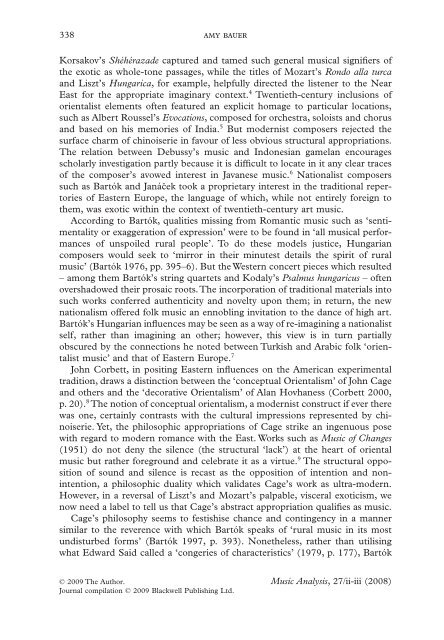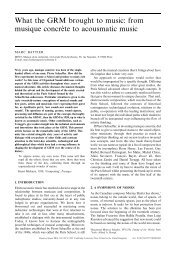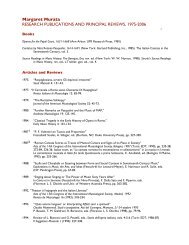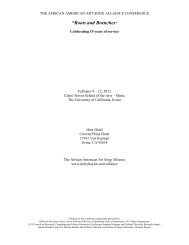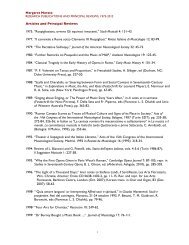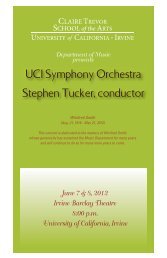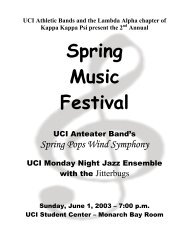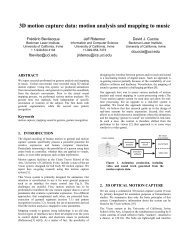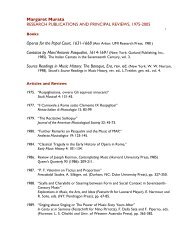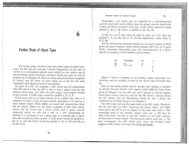amy bauer The Other of the Exotic: Balinese Music as Grammatical ...
amy bauer The Other of the Exotic: Balinese Music as Grammatical ...
amy bauer The Other of the Exotic: Balinese Music as Grammatical ...
Create successful ePaper yourself
Turn your PDF publications into a flip-book with our unique Google optimized e-Paper software.
338 <strong>amy</strong> <strong>bauer</strong><br />
Korsakov’s Shéhérazade captured and tamed such general musical signifiers <strong>of</strong><br />
<strong>the</strong> exotic <strong>as</strong> whole-tone p<strong>as</strong>sages, while <strong>the</strong> titles <strong>of</strong> Mozart’s Rondo alla turca<br />
and Liszt’s Hungarica, for example, helpfully directed <strong>the</strong> listener to <strong>the</strong> Near<br />
E<strong>as</strong>t for <strong>the</strong> appropriate imaginary context. 4 Twentieth-century inclusions <strong>of</strong><br />
orientalist elements <strong>of</strong>ten featured an explicit homage to particular locations,<br />
such <strong>as</strong> Albert Roussel’s Evocations, composed for orchestra, soloists and chorus<br />
and b<strong>as</strong>ed on his memories <strong>of</strong> India. 5 But modernist composers rejected <strong>the</strong><br />
surface charm <strong>of</strong> chinoiserie in favour <strong>of</strong> less obvious structural appropriations.<br />
<strong>The</strong> relation between Debussy’s music and Indonesian gamelan encourages<br />
scholarly investigation partly because it is difficult to locate in it any clear traces<br />
<strong>of</strong> <strong>the</strong> composer’s avowed interest in Javanese music. 6 Nationalist composers<br />
such <strong>as</strong> Bartók and Janáček took a proprietary interest in <strong>the</strong> traditional repertories<br />
<strong>of</strong> E<strong>as</strong>tern Europe, <strong>the</strong> language <strong>of</strong> which, while not entirely foreign to<br />
<strong>the</strong>m, w<strong>as</strong> exotic within <strong>the</strong> context <strong>of</strong> twentieth-century art music.<br />
According to Bartók, qualities missing from Romantic music such <strong>as</strong> ‘sentimentality<br />
or exaggeration <strong>of</strong> expression’ were to be found in ‘all musical performances<br />
<strong>of</strong> unspoiled rural people’. To do <strong>the</strong>se models justice, Hungarian<br />
composers would seek to ‘mirror in <strong>the</strong>ir minutest details <strong>the</strong> spirit <strong>of</strong> rural<br />
music’ (Bartók 1976, pp. 395–6). But <strong>the</strong> Western concert pieces which resulted<br />
– among <strong>the</strong>m Bartók’s string quartets and Kodaly’s Psalmus hungaricus – <strong>of</strong>ten<br />
overshadowed <strong>the</strong>ir prosaic roots.<strong>The</strong> incorporation <strong>of</strong> traditional materials into<br />
such works conferred au<strong>the</strong>nticity and novelty upon <strong>the</strong>m; in return, <strong>the</strong> new<br />
nationalism <strong>of</strong>fered folk music an ennobling invitation to <strong>the</strong> dance <strong>of</strong> high art.<br />
Bartók’s Hungarian influences may be seen <strong>as</strong> a way <strong>of</strong> re-imagining a nationalist<br />
self, ra<strong>the</strong>r than imagining an o<strong>the</strong>r; however, this view is in turn partially<br />
obscured by <strong>the</strong> connections he noted between Turkish and Arabic folk ‘orientalist<br />
music’ and that <strong>of</strong> E<strong>as</strong>tern Europe. 7<br />
John Corbett, in positing E<strong>as</strong>tern influences on <strong>the</strong> American experimental<br />
tradition, draws a distinction between <strong>the</strong> ‘conceptual Orientalism’ <strong>of</strong> John Cage<br />
and o<strong>the</strong>rs and <strong>the</strong> ‘decorative Orientalism’ <strong>of</strong> Alan Hovhaness (Corbett 2000,<br />
p. 20). 8 <strong>The</strong> notion <strong>of</strong> conceptual orientalism, a modernist construct if ever <strong>the</strong>re<br />
w<strong>as</strong> one, certainly contr<strong>as</strong>ts with <strong>the</strong> cultural impressions represented by chinoiserie.<br />
Yet, <strong>the</strong> philosophic appropriations <strong>of</strong> Cage strike an ingenuous pose<br />
with regard to modern romance with <strong>the</strong> E<strong>as</strong>t. Works such <strong>as</strong> <strong>Music</strong> <strong>of</strong> Changes<br />
(1951) do not deny <strong>the</strong> silence (<strong>the</strong> structural ‘lack’) at <strong>the</strong> heart <strong>of</strong> oriental<br />
music but ra<strong>the</strong>r foreground and celebrate it <strong>as</strong> a virtue. 9 <strong>The</strong> structural opposition<br />
<strong>of</strong> sound and silence is rec<strong>as</strong>t <strong>as</strong> <strong>the</strong> opposition <strong>of</strong> intention and nonintention,<br />
a philosophic duality which validates Cage’s work <strong>as</strong> ultra-modern.<br />
However, in a reversal <strong>of</strong> Liszt’s and Mozart’s palpable, visceral exoticism, we<br />
now need a label to tell us that Cage’s abstract appropriation qualifies <strong>as</strong> music.<br />
Cage’s philosophy seems to festishise chance and contingency in a manner<br />
similar to <strong>the</strong> reverence with which Bartók speaks <strong>of</strong> ‘rural music in its most<br />
undisturbed forms’ (Bartók 1997, p. 393). None<strong>the</strong>less, ra<strong>the</strong>r than utilising<br />
what Edward Said called a ‘congeries <strong>of</strong> characteristics’ (1979, p. 177), Bartók<br />
© 2009 <strong>The</strong> Author.<br />
Journal compilation © 2009 Blackwell Publishing Ltd.<br />
<strong>Music</strong> Analysis, 27/ii-iii (2008)


